BUY THE DVD:
|


|
|
|
SYNOPSIS:
| |
in the waning days of the american civil war, a wounded soldier embarks on a perilous journey back home to cold mountain, north carolina to reunite with his sweetheart.
|
|
|
MOVIE FACT:
| |
as of 2003, this was the most expensive film miramax has financed on its own, with a budget of about $85 million.
|
|
|
RATING:
|


two out of four possible stars
|
|
|
|
In its swiftly moving two and a half hours, the characters of Cold Mountain pull the audience from the depths of hell to the and right back to the inferno. Most audience members will have prior knowledge of how horrific a struggle the American Civil War was even before they see the desperate individuals in this film barely scrape by with hardly a reason to keep on living. The battle sequence at the beginning of the film is ingeniously photographed and is tangeable in its realism, but beyond that battle, the audience is shown horror after horror as people try to survive through the bleakest of times.
With such a heavy shadow covering this film, it was prudent of the filmmakers to allow the characters to engage in a few words of levity to offset the heavy drama usually occurring on screen. Though the film can hardly be called a comedy, the inclusion of some of life's more innocent moments shows director and writer Anthony Minghella's willingness to let all the foilbles of human life appear in his film. But it's difficult to say whether the realism and stark nature of the story represent too intense an effort by Minghella to show the audience just how difficult life was back then. Farm animals are routinely killed throughout the film and one might wonder whether the idea of "less is more" ever crossed Minghella's mind.
After watching Renée Zellweger's "Ruby" break the neck of a rooster and then rip its head off, was it really necessary to witness Eileen Atkins (playing mountain-woman, "Maddy") slit the throat of a young white goat? At least the editor had the sense to cut away from the picture when Jude Law begins sawing off the head of a cow. The blood and the gore are graphic, but once you've established the level of violence in the film, it's not something that needs to be repeated so often. Though the filmmakers might be congratulated for their "realism," the overall effectiveness of it all is lessened because what was once shocking slowly becomes routine.
Fortunately, calling Jude Law's performance "routine" is impossible, given his absorbing turn as "Inman," a resident of Cold Mountain who goes to war when Southern troops begin mobilizing. He pulls off the Southern accent with ease and is intensely profound without pushing his character's believability over-the-top. In her role as "Ruby Thewes," farm woman and laborer extraordinaire, Renée Zellweger usually is over-the-top, but that's far from being a bad thing. Her excitability and zeal for her role makes her performance one of the most affecting of the picture, even when she's muttering comedic one-liners or plucking the heads off chickens.
The film's timeline is presented in a way that reveals the growing relationship between Inman and Ada (Nicole Kidman's character) before the war while simultaneously showing Inman's perilous journey back to Cold Mountain and Ada's struggle to survive during his absense. If not for this duel timeline, the audience would probably find much less believability in their relationship given their very brief time together. As it is, it is mostly Jude's tireless performance that makes you believe he would give up everything for the love of a woman he barely knows. Although she is a radiant presence on screen, one has to question Nicole Kidman's casting in the lead role, as her demeaner sometimes feels out of sync with the rest of the cast.
Though her character is supposed to be out of her element in the wilds of Cold Mountain, having been born and bred a lady in Charleston, Kidman herself just doesn't mesh completely with the rest of the characters. The intensity of her performance cannot be denied, but as Ada, Kidman's passion for the role doesn't seem to have been sufficient to overcome the fact that somebody else might have been more natural in the part.
Regarding the supporting performances (there are several small, yet important roles), the casting seems to have been very well done, with Philip Seymour Hoffman making a fine apperance as the Reverend Veasy, a man ousted from his town after an affair with a slave girl. Hoffman's performance is worth equal parts of depression and hilarity and his story is a welcome vignette in the larger scheme of things. In a minor role as a widowed woman trying to survive in the wilderness with nothing but a log cabin and her child, Natalie Portman turns in a powerful performance even if her story seems to have been cut short by the editor's knife.
Despite the strong acting on the screen though, Minghella's efforts to bring the horrors and triumphs of the Civil War to a visual medium has been hampered by the overwhelming ideas of war and suffering and "doing without." The location and the time period all but overcome the actors at some points and the visuals are allowed more importance than the people living in that era. Cold Mountain is a beautiful and vivid film, but more care should have been taken in allowing the characters and their circumstances to remain of paramount importance in the story so as to allow the time period and its difficulties to really make an emotional mark on the audience.
Review by Kelsey Wyatt.
| |
|